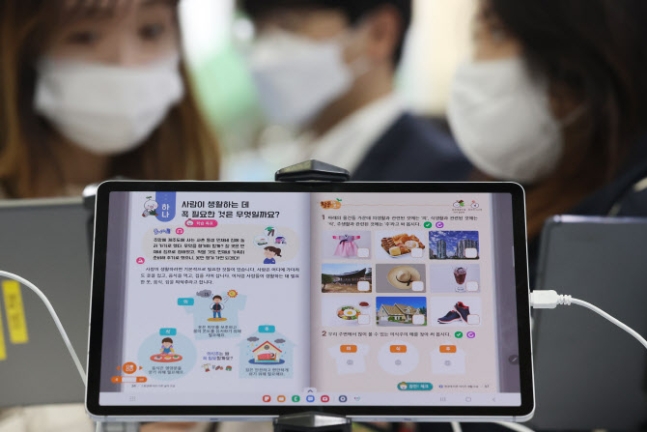 |
| ▲ Digital Textbook on display at the '2022 EdTech Korea Fair Forum' held at COEX, Gangnam-gu, Seoul, last September 22 (Source: Yonhap News) |
On February 23, the Ministry of Education announced a 'Digital- Based Education Innovation Plan,' that digital textbooks for Korean schools will go into use, starting in 2025. It will begin with three subjects: Mathematics, English, and Information. Later this year, the Ministry of Education plans to select seven pilot education offices, and test- run 300 leading schools with AI- based courses. Students in third and fourth grades, as well as seventh graders, will be the first to benefit from the shift beginning in 2025. Students in grades five, six, and eight will use digital textbooks in 2026, followed by ninth graders in 2027. To avoid confusion for educators and students during the transition period, both print and digital textbooks will be used in classes until 2028. Based on the results and public opinions, the government will consider an entire conversion to digital textbooks in 2028. The Ministry of Education wants to use AI technology to provide students with customized education and to transform it into ways of developing creativity and convergence capabilities.
However, there are concerns among teachers and parents. Teachers do agree with the need to use digital technology; however, they say that in order to progress into customized education for all, the priority must be to reduce the number of students per class, secure teachers, and build digital infrastructure. This means that the problem of overcrowded classes must be solved. Parents worry about their kids' further dependence on digital devices will result in a decline in academic performance. This is because students are highly dependent on smart devices in daily life. What would CWNU students think of using digital textbooks? According to a survey conducted by The Campus Journal from March 1 to March 3, 58.7% of the respondents were concerned about the use of digital textbooks in Korean schools. Most of the students who opposed the use of digital textbooks pointed out that digital textbooks can be used for entertainment rather than academic purposes, causing students to lose concentration.
In fact, when e- courses were in full swing due to COVID- 19 in 2020, the Ministry of Education made several attempts to use digital textbooks: but failed. According to the Ministry of Education, the '2nd Generation Digital Textbook,' which will be introduced in 2025, differs from the previous digital textbook. The most significant difference is artificial intelligence (AI). It's not just the idea of digitalizing paper textbooks: The "2nd Generation Digital Textbook," is designed to check students' understanding of lessons in real- time and to provide teachers with information to help students move forward with customized courses. The Ministry of Education explained, "With the help of digital textbooks, every student will be able to solve a problem that corresponds to their level of achievement and get immediate feedback." It also claimed that students would learn through digital textbooks, enabling classes to shift towards discussions and project- based learning, rather than lectures.
Many people, however, are skeptical that the use of digital textbooks in the reality of pre-college curriculum, will result in class discussions and project- based learning. Park Seong-wook, the Policy Director of the KTU, said, "Individualized learning may be possible until the lower grades of primary school. However, as students attend middle school and become increasingly anxious about entry exams, digital education is more likely to become a problem- solving education." With issues regarding the introduction of digital textbooks continuing to rise, the Ministry of Education will need to come up with a solution that everyone can agree on to introduce digital textbooks. Experts advise that the proper use of digital textbooks should be taught first. In response, the Ministry of Education emphasized, "By allowing teachers to focus more on students, we will create an educational environment that develops core competencies in the digital era." Lee Ju- ho, the Minister of Education, said, "We can use digital technology to achieve the fundamental goal of education known as, 'Education for All,' presented by the United Nations in 1990. We promise to make significant changes in the educational field."
By Park Jeong-hyeon, reporter jhgongju0903@gmail.com
<저작권자 © The Campus Journal, 무단 전재 및 재배포 금지>

 Shrinkflation, Consumer Deception
Shrinkflation, Consumer Deception




